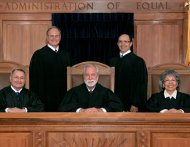6/28/2010
New Mexico Supreme Court Upholds Phone Tip DUI ConvictionNew Mexico high court allows police to make warrantless drunk driving arrest without having seen the suspect drive.

The New Mexico Supreme Court on Thursday expanded the ability of police to jail suspects for driving under the influence of alcohol (DUI) by allowing arrests to be made solely based on third-party tips. The ruling was handed down two weeks after the same court had relaxed DUI arrest rules so that motorists sleeping off a night of drinking in their automobiles would not be hit with the same penalty as if they had driven away (read decision).
On December 22, 2007, Marcos Martinez was taken into custody for drunk driving in the city of Santa Fe not because an officer saw him commit a crime, but because someone who works at a mall called in a tip. Santa Fe Police Sergeant Troy Baker responded to the call which alleged that a man was staggering in the DeVargas Mall parking lot, eventually driving away in a van. The caller had provided a license plate, so Baker went to the van owner's home to investigate. Inside the home, Martinez was clearly drunk and unlocked the door when Baker knocked. Baker entered and arrested Martinez.
A district court found the arrest unlawful under the common law "misdemeanor arrest rule" that states a suspect may only be arrested for a misdemeanor that is committed in an officer's presence. The rule does not apply to felonies.
"Under the common law rules for warrantless arrests, there is an inherent balance between public safety and a suspect's constitutional rights," Patricio M. Serna explained in the unanimous decision. "Because felonies are a greater concern with respect to public safety, officers are granted more latitude when conducting investigations of such crimes. Conversely, since less severe crimes (misdemeanors) do not threaten public safety to the level of felonies, a warrantless arrest of a suspected misdemeanant cannot be made unless the arresting officer personally observes the offense."
The court then decided that although the legislature had designated first-time DUI to be a misdemeanor and not a felony, it would rescind the common law tradition and create a new category -- a misdemeanor that is not a "minor crime."
"Given the compelling public interest in eradicating DWI occurrences and the potentially deadly consequences, the crime of DWI should be treated as a felony for purposes of warrantless arrests," Serna wrote. "Although a DWI offender who has had less than three convictions would only be guilty of a misdemeanor, such a classification makes no difference in the severity of the offense's consequences, nor does it dilute the public's concern."
The court added that it was important to avoid requiring a warrant before attempting to arrest a suspect not seen driving because that individual might later drive a car.
"In addition to the effect on the evidence, there is also a risk that during the time period in which the officer is obtaining a warrant, a suspect may get into his or her car and drive away, endangering both himself or herself and the public at large," Serna wrote. "Such a risk is untenable given the strong public interest in deterring the crime of DWI.... Instead, the warrantless arrest of one suspected of committing DWI is valid when supported by both probable cause and exigent circumstances."
A copy of the decision is available in a 30k PDF file at the source link below.


